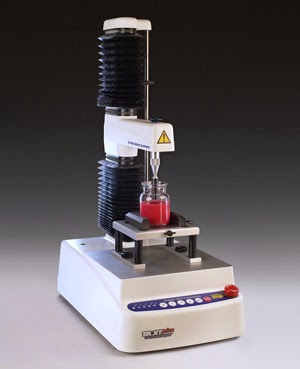 The CHEESE GRATING RIG (A/GR) comprises a grating platform consisting of interchangeable grating faces and a sample block holder which acts as a sample template and, during the test, holds the sample in place.
The CHEESE GRATING RIG (A/GR) comprises a grating platform consisting of interchangeable grating faces and a sample block holder which acts as a sample template and, during the test, holds the sample in place. The rig is used in conjunction with the TA.XTplus texture analyser which unusually in this case is used in a horizontal position to ensure a constant application of force onto the sample. This configuration also means that samples can be tested repeatedly over several cycles without the need for reloading.
The location of a weight above the sample allows the cheese to maintain constant contact with the grating platform face for a consistent measurement.
The rig is adaptable, with the provision of two types of grating face and a mandoline blade (inserts A/GRC, A/GRF, A/GRM) for the measurement of sliceability. This ensures realistic testing conditions and provides valuable information about the quality and performance of the cheese as well as how it is best processed.
Our new grating rig allows manufacturers to test many types of cheese, the results of which can help guide research and development plans, optimise processing parameters and inform and facilitate quality control.
As well as evaluating cheese as an end-product in dairies, the grating rig can also be used in food processing environments to ensure it can withstand high speed processing in applications such as pizzas, ready meals, sauces and snack foods.
For the first time, dairies can scientifically, objectively and repeatedly measure shreddability, enabling them to perfect their cheese recipes and production and packaging processes.
Retail-ready grated cheese is a fast-growing market throughout Europe as the need for convenience and variety continues to dominate. As a result, cheese which might historically have been offered only in block form must now be able to withstand intense shredding, product transfer and packaging without clogging up machinery. Texture analysis helps dairies evaluate the mechanical properties that will influence not only their product’s mouthfeel, but also processability.
Whether as a core ingredient in a sauce or a topping on a pizza, cheese is a versatile performer, able to take on a variety of functional roles. Cheese can, however, be affected by varying environmental conditions which can have an adverse effect on shreddability which is also influenced by factors such as fat, moisture and salt content, pH and maturity. Similarly, the way cheese is handled and processed influences how well it shreds and therefore the quality of a finished shredded product.
As well as evaluating cheese as an end-product in dairies, the grating rig can also be used in food processing environments to ensure it can withstand high speed processing in applications such as pizzas, ready meals, sauces and snack foods.
For the first time, dairies can scientifically, objectively and repeatedly measure shreddability, enabling them to perfect their cheese recipes and production and packaging processes.
Retail-ready grated cheese is a fast-growing market throughout Europe as the need for convenience and variety continues to dominate. As a result, cheese which might historically have been offered only in block form must now be able to withstand intense shredding, product transfer and packaging without clogging up machinery. Texture analysis helps dairies evaluate the mechanical properties that will influence not only their product’s mouthfeel, but also processability.
Whether as a core ingredient in a sauce or a topping on a pizza, cheese is a versatile performer, able to take on a variety of functional roles. Cheese can, however, be affected by varying environmental conditions which can have an adverse effect on shreddability which is also influenced by factors such as fat, moisture and salt content, pH and maturity. Similarly, the way cheese is handled and processed influences how well it shreds and therefore the quality of a finished shredded product.
We can design and manufacture probes or fixtures for the TA.XTplus texture analyser that are bespoke to your sample and its specific measurement.
Once your measurement is performed, our expertise in its graphical interpretation is unparalleled. Not only can we develop the most suitable and accurate method for the testing of your sample, but we can also prepare analysis procedures that obtain the desired parameters from your curve and drop them into a spreadsheet or report designed around your requirements.
For more information on how to measure texture, please visit the Texture Analysis Properties section on our website.
 The TA.XTplus texture analyser is part of a family of texture analysis instruments and equipment from Stable Micro Systems. An extensive portfolio of specialist attachments is
available to measure and analyse the textural properties of a huge range of
food products. Our technical experts
can also custom design instrument fixtures according to individual
specifications.
The TA.XTplus texture analyser is part of a family of texture analysis instruments and equipment from Stable Micro Systems. An extensive portfolio of specialist attachments is
available to measure and analyse the textural properties of a huge range of
food products. Our technical experts
can also custom design instrument fixtures according to individual
specifications.No-one understands texture analysis like we do!
To discuss your specific test requirements click here...
 |  |  |



No comments:
Post a Comment